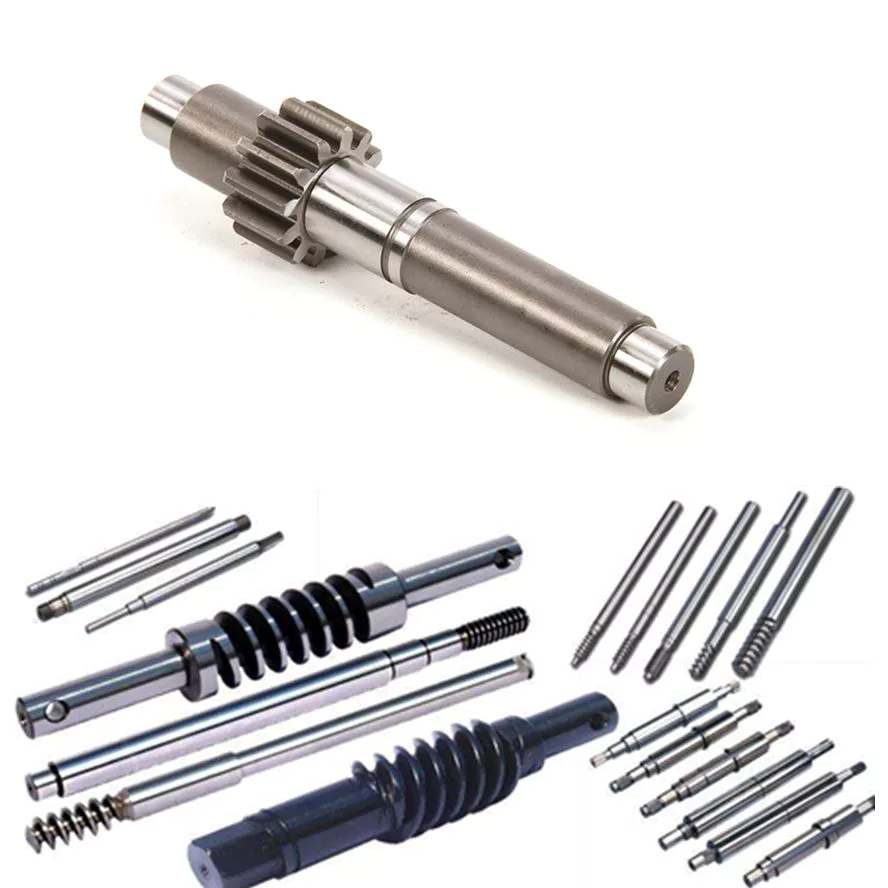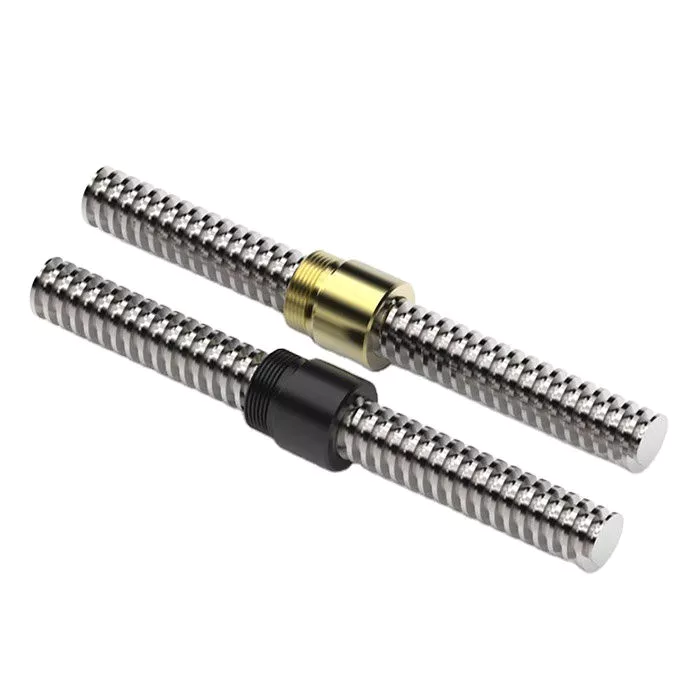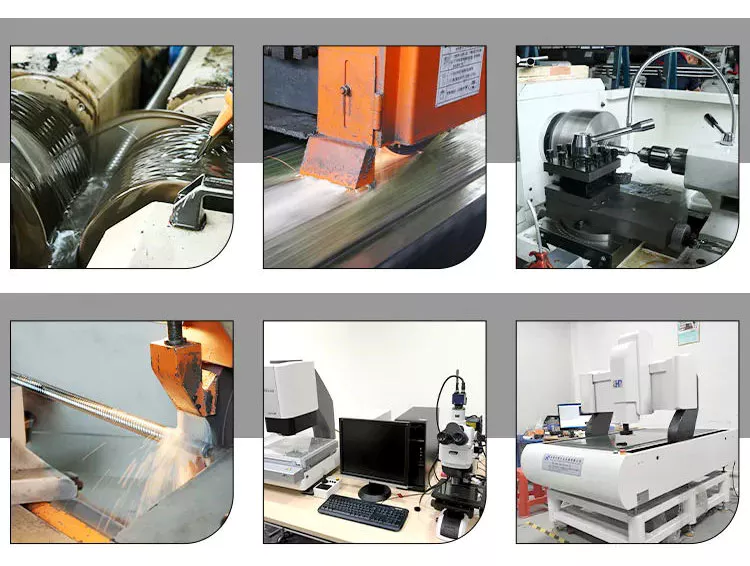Product Description
Product Description
SFK series Domestic Chinese miniature ball screw shaft with nut details
High precision low noise CZPT ball screw
Ball screw is made of screw, nut and ball. The function is to turn the rotary motion into liner motion, which is a further extension and development of ball screw. The significance of this development is to move into a rolling bearing from sliding action; With little friction, ball screws are widely used in various industrial equipment and precision instruments.
Products overview
High Reliability
TBI MOTION or CZPT ball screw has very stringent quality control standards covering every production process. With proper lubrication and use,trouble-free operation for an extended period of time is possible.
Smooth Operation
The high efficiency of ball screws is vastly superior to conventional screws. The torque required is less than 30%. Linear motion can be easily changed from rotary motion.
High Rigidity and Preload
When axial play is minimized in conventional screw-nut assemblies, the actuating torque becomes excessive and the operation is not smooth. The axial play in TBI MOTION or CZPT precision ball screws may be reduced to zero by preloading and a light smooth operation is still possible. herefore, both low torque and high rigidity can be obtained simultaneously.TBI MOTION or CZPT ball screws have gothic CZPT groove profiles which allow these conditions to be achieved.
Circulation Method
Ball return tube method.(V,E,S,Y type);Ball defelector method.(I,U,M,K type)
High Durability
Rigidly selected materials, intensive heat treating and processing techniques, backed by years of experience,have resulted in the most durable ball screws manufactured.
Ball screw size are the same as ZheJiang TBI ball screw shafts and nuts, they can be interchanged into each other
Detailed Photos
We are CZPT to machinize the end sides of ball screw shafts according to your requirements
ball screw produced by CZPT company (cnc ball screw)
Original TBI ball screw
Ball screw assembly is consisted of screw, nut and ball. The function is to turn the rotary motion into
liner motion, which is a further extension and development of ball screw. The significance of this
development is to move into a rolling bearing from sliding action; With little friction, ball screws are
widely used in various industrial equipment and precision instruments. Especially in recent years,
it is widely used in CNC machine tools. ball screw is made by grinding and whirling, or rolled, and it
has 2 kinds of ball screw, accuracy from 1 to 7, 1 is the highest and 7 is the lowest.
There are many parts what can be matched into the ball screw, Please
choose what you need:
ERSK Ball Screw and it’s parts
((( ball screw shaft, ball screw Nut, Nut housing, Coupling, End support unit )))
Specification:
- Ground/Cold rolled ball screw; CF53 Germany material;High-speed and smooth operationC5 C7 precision; No gap and preloadingQuality as good as TBI brand is high precision, long life usePay more attention to before-sale, in-sale, after -sales service.Manufacturer with large stock & short delivery
We are CZPT to end machining, if you need, Please let us know before order, and please provide a
detailed end machined drawing, if not, we will not end machined the ball screw.
Any length of the ball screw, we can satisfy to you.
ball screw Related Products: Ball screw end support Nut, bracket, Coupling
There are many different series of ball screw shaft with nut, like SFU series, SFS series, SFI series, SFY series, DFU series, SFUL series, SFK series.Each series has its own characteristics, Let’s look at the difference in appearance and characteristics.
Ball screw Feature
1. Cold rolled ball screw;
2. Gcr15 material;
3. High-speed operation
4. C5 C7 C10 precision;
5. No gap and preloading
6. Quality as good as TBI brand is high precision, long life use.
7. Pay more attention to before-sale, in-sale, after -sales service.
8. Manufacturer with large stock & short delivery
| Ball Screw Features |
|||||
| Item | Material | Heat Treatment |
Hardness | Accurancy | Preload |
| Ball screw shaft | SCM450 S55C CF53 |
Induction Heating |
HRC58-62 | C5:0.018mm C7:0.05mm C10:0.21mm |
P1:Zero P2:Light P3:Medium P4:Heavy |
| Ball screw nut | SCM415 20CrMo |
Carbonizing Hardening |
HRC58-62 | C5:0.018mm | P1:Zero P2:Light P3:Medium P4:Heavy |
| Steel balls | SUJ2 GCr15 |
HRC58-62 | |||
Cold Rolled Ball Screw Application:
1. Engraving machines; 2. High speed CNC machinery;
4. Auto-machinery. 3. Semi-Conductor equipment;
5. Machine tools; 6. Industrial Machinery;
7. Printing machine; 8. Paper-processing machine;
9. Textiles machine; 10. Electronic machinery;
11. Transport machinery; 12. Robot etc.
Rolled ball screws can not only be used in above general machinery, but also in many advanced industries. Rolled ball screw with a motor assembles electrical-mechanical actuator, which is more eco-friendly than hydraulic pump system. Nowadays it’s applied to electric vehicles, solar power plants, railway devices and many medical and leisure equipments.
Installation Instructions
The way to assemble the ball screw nut in the ball screw shaft
Related products
Our service
Over Service and Our principle:
Quality first, credibility is the key, the price followed
Our Advantages
Packaging & Shipping
Packaging and shipping
PP bag for each linear shaft, Standard exported carton outside for small order shipping by international express,such as DHL, TNT, UPS,Wooden box outside for big quantity or very
long linear shaft by sea, by air
Company Profile
Company Information
HangZhou Wangong Precision Machinery Co., Ltd’s CZPT brand is the leading brand of rolled ball screw and linear CZPT in China. We design and produce our own rolling tools, and we can produce all kinds of screws and nuts or linear CZPT upon customer’s requests.
We produce cold rolled ball screw in large stock, Specification include: 1204, 1604, 1605, 1610, 2004, 2005, 2571, 2505, 2510, 3205, 3210, 4005, 4571, 4571, 5005, 5571, 6310, etc. (Having all kinds of models) the max length 6000mm, we suggest customer accept 3000mm, it’s easy packing, easy and safe for transport.
Related Products:
Ball screw end support
Nut bracket
Coupling
All those relative products have large stock.
Frequently Asked Questions
1. What’s your main products?
Cold rolled ball screws, ball screw support units, Linear CZPT rails, Linear motion ball slide bearing, Cylinder rails, Linear shaft, Couplings, etc.
2. How can I get a sample to check your quality?
After price confirmation, sample order is available to check our quality.
3. When can I get the quotation?
We usually quote within 24 hours after we get your inquiry. If you are very urgent to get the price, please call us or tell us in your email so that we will regard your inquiry priority.
4. Can you do ball screw end machine processing?
Yes. We have a professional team having rich experience in end machine processing, please provide us the drawing with the tolerance and we will help you to make the ball screws depending on the drawing.
5. How long is the lead time for mass production?
Honestly, it depends on the order quantity and the season you place the order. The lead time of MOQ is about 7 to 15 days. Generally speaking, we suggest that you start inquiry 2 months before the date you would like to get the products at your country.
Get more detailed information! ! !
Inquiry with us, Now! ! !
We will reply within 24 Hours! ! !
Screws and Screw Shafts
A screw is a mechanical device that holds objects together. Screws are usually forged or machined. They are also used in screw jacks and press-fitted vises. Their self-locking properties make them a popular choice in many different industries. Here are some of the benefits of screws and how they work. Also read about their self-locking properties. The following information will help you choose the right screw for your application.
Machined screw shaft
A machined screw shaft can be made of various materials, depending on the application. Screw shafts can be made from stainless steel, brass, bronze, titanium, or iron. Most manufacturers use high-precision CNC machines or lathes to manufacture these products. These products come in many sizes and shapes, and they have varying applications. Different materials are used for different sizes and shapes. Here are some examples of what you can use these screws for:
Screws are widely used in many applications. One of the most common uses is in holding objects together. This type of fastener is used in screw jacks, vises, and screw presses. The thread pitch of a screw can vary. Generally, a smaller pitch results in greater mechanical advantage. Hence, a machined screw shaft should be sized appropriately. This ensures that your product will last for a long time.
A machined screw shaft should be compatible with various threading systems. In general, the ASME system is used for threaded parts. The threaded hole occupies most of the shaft. The thread of the bolt occupy either part of the shaft, or the entire one. There are also alternatives to bolts, including riveting, rolling pins, and pinned shafts. These alternatives are not widely used today, but they are useful for certain niche applications.
If you are using a ball screw, you can choose to anneal the screw shaft. To anneal the screw shaft, use a water-soaked rag as a heat barrier. You can choose from 2 different options, depending on your application. One option is to cover the screw shaft with a dust-proof enclosure. Alternatively, you can install a protective heat barrier over the screw shaft. You can also choose to cover the screw shaft with a dust-proof machine.
If you need a smaller size, you can choose a smaller screw. It may be smaller than a quarter of an inch, but it may still be compatible with another part. The smaller ones, however, will often have a corresponding mating part. These parts are typically denominated by their ANSI numerical size designation, which does not indicate threads-per-inch. There is an industry standard for screw sizes that is a little easier to understand.
Ball screw nut
When choosing a Ball screw nut for a screw shaft, it is important to consider the critical speed of the machine. This value excites the natural frequency of a screw and determines how fast it can be turned. In other words, it varies with the screw diameter and unsupported length. It also depends on the screw shaft’s diameter and end fixity. Depending on the application, the nut can be run at a maximum speed of about 80% of its theoretical critical speed.
The inner return of a ball nut is a cross-over deflector that forces the balls to climb over the crest of the screw. In 1 revolution of the screw, a ball will cross over the nut crest to return to the screw. Similarly, the outer circuit is a circular shape. Both flanges have 1 contact point on the ball shaft, and the nut is connected to the screw shaft by a screw.
The accuracy of ball screws depends on several factors, including the manufacturing precision of the ball grooves, the compactness of the assembly, and the set-up precision of the nut. Depending on the application, the lead accuracy of a ball screw nut may vary significantly. To improve lead accuracy, preloading, and lubrication are important. Ewellix ball screw assembly specialists can help you determine the best option for your application.
A ball screw nut should be preloaded prior to installation in order to achieve the expected service life. The smallest amount of preload required can reduce a ball screw’s calculated life by as much as 90 percent. Using a lubricant of a standard grade is recommended. Some lubricants contain additives. Using grease or oil in place of oil can prolong the life of the screw.
A ball screw nut is a type of threaded nut that is used in a number of different applications. It works similar to a ball bearing in that it contains hardened steel balls that move along a series of inclined races. When choosing a ball screw nut, engineers should consider the following factors: speed, life span, mounting, and lubrication. In addition, there are other considerations, such as the environment in which the screw is used.
Self-locking property of screw shaft
A self-locking screw is 1 that is capable of rotating without the use of a lock washer or bolt. This property is dependent on a number of factors, but 1 of them is the pitch angle of the thread. A screw with a small pitch angle is less likely to self-lock, while a large pitch angle is more likely to spontaneously rotate. The limiting angle of a self-locking thread can be calculated by calculating the torque Mkdw at which the screw is first released.
The pitch angle of the screw’s threads and its coefficient of friction determine the self-locking function of the screw. Other factors that affect its self-locking function include environmental conditions, high or low temperature, and vibration. Self-locking screws are often used in single-line applications and are limited by the size of their pitch. Therefore, the self-locking property of the screw shaft depends on the specific application.
The self-locking feature of a screw is an important factor. If a screw is not in a state of motion, it can be a dangerous or unusable machine. The self-locking property of a screw is critical in many applications, from corkscrews to threaded pipe joints. Screws are also used as power linkages, although their use is rarely necessary for high-power operations. In the archimedes’ screw, for example, the blades of the screw rotate around an axis. A screw conveyor uses a rotating helical chamber to move materials. A micrometer uses a precision-calibrated screw to measure length.
Self-locking screws are commonly used in lead screw technology. Their pitch and coefficient of friction are important factors in determining the self-locking property of screws. This property is advantageous in many applications because it eliminates the need for a costly brake. Its self-locking property means that the screw will be secure without requiring a special kind of force or torque. There are many other factors that contribute to the self-locking property of a screw, but this is the most common factor.
Screws with right-hand threads have threads that angle up to the right. The opposite is true for left-hand screws. While turning a screw counter-clockwise will loosen it, a right-handed person will use a right-handed thumb-up to turn it. Similarly, a left-handed person will use their thumb to turn a screw counter-clockwise. And vice versa.
Materials used to manufacture screw shaft
Many materials are commonly used to manufacture screw shafts. The most common are steel, stainless steel, brass, bronze, and titanium. These materials have advantages and disadvantages that make them good candidates for screw production. Some screw types are also made of copper to fight corrosion and ensure durability over time. Other materials include nylon, Teflon, and aluminum. Brass screws are lightweight and have aesthetic appeal. The choice of material for a screw shaft depends on the use it will be made for.
Shafts are typically produced using 3 steps. Screws are manufactured from large coils, wire, or round bar stock. After these are produced, the blanks are cut to the appropriate length and cold headed. This cold working process pressudes features into the screw head. More complicated screw shapes may require 2 heading processes to achieve the desired shape. The process is very precise and accurate, so it is an ideal choice for screw manufacturing.
The type of material used to manufacture a screw shaft is crucial for the function it will serve. The type of material chosen will depend on where the screw is being used. If the screw is for an indoor project, you can opt for a cheaper, low-tech screw. But if the screw is for an outdoor project, you’ll need to use a specific type of screw. This is because outdoor screws will be exposed to humidity and temperature changes. Some screws may even be coated with a protective coating to protect them from the elements.
Screws can also be self-threading and self-tapping. The self-threading or self-tapping screw creates a complementary helix within the material. Other screws are made with a thread which cuts into the material it fastens. Other types of screws create a helical groove on softer material to provide compression. The most common uses of a screw include holding 2 components together.
There are many types of bolts available. Some are more expensive than others, but they are generally more resistant to corrosion. They can also be made from stainless steel or aluminum. But they require high-strength materials. If you’re wondering what screws are, consider this article. There are tons of options available for screw shaft manufacturing. You’ll be surprised how versatile they can be! The choice is yours, and you can be confident that you’ll find the screw shaft that will best fit your application.

